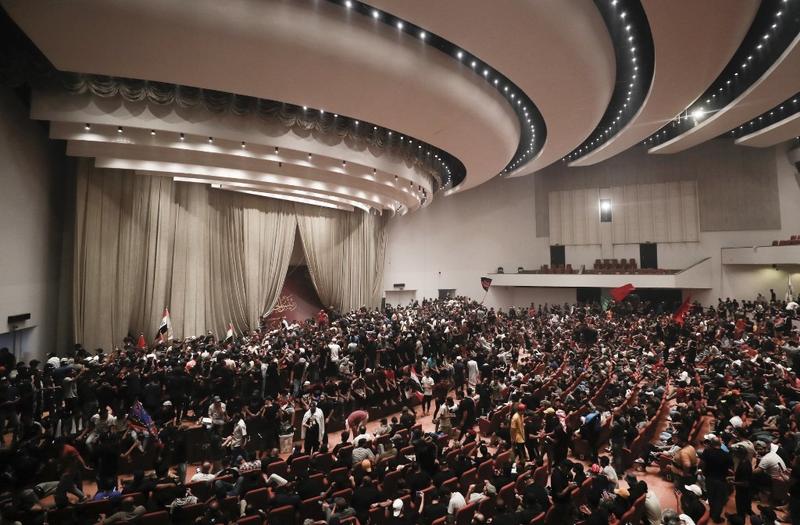 Supporters of cleric Moqtada Sadr, protesting against a rival bloc's nomination for prime minister, gather inside Iraq's parliament in the capital Baghdad's high-security Green Zone, on July 30, 2022. (AHMAD AL-RUBAYE / AFP)
Supporters of cleric Moqtada Sadr, protesting against a rival bloc's nomination for prime minister, gather inside Iraq's parliament in the capital Baghdad's high-security Green Zone, on July 30, 2022. (AHMAD AL-RUBAYE / AFP)
BAGHDAD - Supporters of Iraqi populist leader Moqtada al-Sadr erected tents and prepared for an open-ended sit-in at Iraq's parliament on Sunday, in a move that could prolong political deadlock or plunge the country into fresh violence.
Thousands of the Shi'ite Muslim cleric's loyalists stormed into the fortified Green Zone in Baghdad on Saturday, taking over the empty parliament building for a second time in a week as his Shi'ite rivals, most of them close to Iran, try to form a government.
The Sadrist Movement came first in an October election as the largest party in parliament, making up around a quarter of its 329 members
"We're staying until our demands are met. And we have many demands," a member of Sadr's political team told Reuters by phone, speaking on condition of anonymity because he is not allowed to give statements to media.
ALSO READ: Iran welcomes Iraq's role in promoting regional dialogue
Sadr's social-political Sadrist Movement is demanding that parliament be dissolved and new elections be held and that federal judges be replaced, the Sadrist official said.
The Sadrist Movement came first in an October election as the largest party in parliament, making up around a quarter of its 329 members.
Iran-aligned parties suffered heavy losses at the polls, with the exception of former Prime Minister Nouri al-Maliki, an arch rival of Sadr.
Sadr failed to form a government free of those parties, however, beset by just enough opposition in parliament and federal court rulings that stopped him getting his choice of president and prime minister.
READ MORE: 3 rockets land near air base housing US experts in Iraq
He withdrew his lawmakers from parliament in protests and has since used his masses of mostly impoverished Shi'ite followers to agitate through street protests.
The deadlock marks Iraq's biggest crisis in years. In 2017, Iraqi forces, together with a US-led coalition and Iranian military support, defeated the Sunni Muslim extremist Islamic State group that had taken over a third of Iraq.
Two years later, Iraqis suffering from a lack of jobs and services took to the streets demanding an end to corruption, new elections and the removal of all parties - especially the powerful Shi'ite groups - that have run the country since the US-led invasion that toppled Saddam Hussein in 2003.
Government forces and Shi'ite militiamen shot dead hundreds of protesters.


